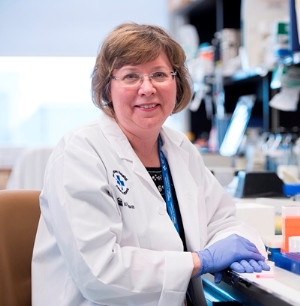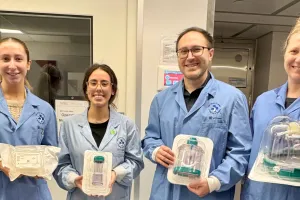Harnessing tumour diversity could improve cancer treatment
 "Restricting the diversity of cells within tumours could greatly improve the effectiveness of current cancer treatments." - Dr. Barbara VanderhydenThe molecular landscape of every tumour is diverse and unique, even within the same type of cancer, according to a study published in Science Advances. Understanding this diversity of cancer cells within a tumour is important because it is ultimately responsible for hiding the tumour from the immune system, fuelling tumour growth and progression, and developing resistance to therapies.
"Restricting the diversity of cells within tumours could greatly improve the effectiveness of current cancer treatments." - Dr. Barbara VanderhydenThe molecular landscape of every tumour is diverse and unique, even within the same type of cancer, according to a study published in Science Advances. Understanding this diversity of cancer cells within a tumour is important because it is ultimately responsible for hiding the tumour from the immune system, fuelling tumour growth and progression, and developing resistance to therapies.
Drs. David Cook and Barbara Vanderhyden surveyed this diversity by exploring the molecular profiles of individual cells from 266 tumours spanning eight different types of cancer using single cell RNA sequencing. They found the molecular landscape of each tumour was highly unique.
They also identified common pathways that could be used to select personalized therapies capable of reducing the diversity of cancer cells in the tumour. They hope that this approach could slow disease progression and improve the efficacy of existing treatments.
Quote: "Restricting the diversity of cells within tumours could greatly improve the effectiveness of current cancer treatments." - Dr. Barbara Vanderhyden, senior scientist at The Ottawa Hospital, professor at the University of Ottawa and Corinne Boyer Chair in Ovarian Cancer Research.
Funding: This study was supported by the Natural Sciences and Engineering Research Council of Canada. All research at The Ottawa Hospital is enabled by The Ottawa Hospital Foundation.
Core Resources: StemCore, Flow Cytometry and Cell Sorting Facility
The Ottawa Hospital is a leading academic health, research and learning hospital proudly affiliated with the University of Ottawa.
Media Contact
Amelia Buchanan
Senior Communication Specialist
Ottawa Hospital Research Institute
613-297-8315
ambuchanan@ohri.ca
Learn more about:
The Ottawa Hospital is a leading academic health, research and learning hospital proudly affiliated with the University of Ottawa and supported by The Ottawa Hospital Foundation.


